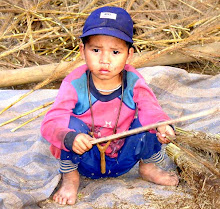In many so-called “third world” countries missionaries often get involved in providing health care. And it doesn’t take long after treating so many of the same diseases in many people that they realize “an ounce of prevention is worth a pound of cure.” Thousands of people die on a daily basis from diseases or conditions that are easily preventable. Bandaging the ailment doesn’t really solve the problem. People need education on how to keep themselves from falling into the problem.
These could be very simple things like: Wash your hands before eating. Boil water before drinking it. Wear shoes if you’re walking where animals defecate. Drink plenty of water. Sleep under a mosquito net. And so many more instructions that will improve the health of a village by the prevention of common problems that everyone face.
And so health workers schedule village-wide meetings to instruct everyone on these issues at one time. This saves the health workers from having to go around door to door and repeating the same things at each place. It prevents people from misunderstanding and claiming they were told differently than others. It also allows everyone to hear answers to questions that concern the people that perhaps the health worker wouldn’t have thought to tell everyone.
But the work of the doctor or health worker is still far from over after these mass health education seminars. Just because everyone faces certain common health threats, each person may still have their own health issues that are different from others. This means the health worker must still go around and give everyone a personal check-up.
I really think that the role of a “pastor” is that of a “spiritual health worker.” And here is my main point:
Preaching sermons to large groups of people is both good and needed. At the same time, so is one-on-one counseling, prayer and accountability with each of his people. The sermons cover things that are common to all people. The one-on-one times cover issues that each specific individual faces. And everyone, everyone, has issues—even if it isn’t a problem or a “sin-issue” it is still an issue of growth and service unto God’s likeness.
So, if you can, please tell me what the difference between pastoral care and discipleship is. In the original language, a “pastor” is a shepherd. A shepherd raises sheep. A shepherd wants his sheep to be all that a sheep can be. So, that includes both the prevention of attacks and proper growth.
While a doctor might be primarily concerned with preventing and curing problems, a good health worker wants to see each person grow strong and be capable of working and serving society. Similarly, a good pastor is not only worried about spiritual problems their people face (whether problems they already have or those they might have if they’re not careful), but he is worried about the spiritual growth and service his people are able to do.
This takes both mass-instruction time, and personal one-on-ones.
Thursday, May 21, 2009
Subscribe to:
Post Comments (Atom)










Wow. That's a huge responsibility. I think that is something one definitely needs to be called to do. The more a ministry grows, the more difficult the struggle against pride. A constant struggle for me.
ReplyDeleteGlad you're writing again, Koffijah. I've missed your posts very much.